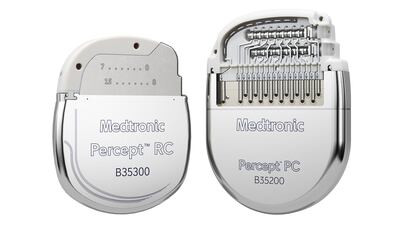Surgery
In this week’s Digital Health Roundup, Medtech Insight’s Ryan Nelson highlights Click Therapeutics’ FDA-cleared digital therapeutics (DTx) for depression and Sinaptica Therapeutics’ personalized neuromodulation for Alzheimer’s patients. Marion Webb discusses her interview with MindMaze’s John Krakauer on their gaming-focused DTx to help people recover from serious brain injuries. Elizabeth Orr introduces new voting members of the new Digital Health Advisory Committee and Natasha Barrow discusses Hello Heart’s new symptom-tracking feature in their heart-focused app.
In this week’s Digital Health Roundup, Medtech Insight’s Ryan Nelson highlights Click Therapeutics’ FDA-cleared digital therapeutics (DTx) for depression and Sinaptica Therapeutics’ personalized neuromodulation for Alzheimer’s patients. Marion Webb discusses her interview with MindMaze’s John Krakauer on their gaming-focused DTx to help people recover from serious brain injuries. Elizabeth Orr introduces new voting members of the new Digital Health Advisory Committee and Natasha Barrow discusses Hello Heart’s new symptom-tracking feature in their heart-focused app.
Getinge says it plans to pay about $477m for organ transport and services company Paragonix Technologies in an effort to “redefine the market standard in transplantation.”
J&J buys heart failure implant company V-Wave, whose Ventura Interatrial Shunt could be the first device of its kind aimed to reach the roughly 800,000 patients in the US who experience heart failure and reduce ejection fraction every year.
Caresyntax said it will use the $180m it recently raised in a series C extension and debt financing round to build out its vendor-neutral surgery platform aimed to help surgeons with real-time and long-term decision support to improve patient outcomes and efficiencies.
Medtronic receives US FDA approval for deep brain stimulation surgery for people with Parkinson’s and essential tremors while the patient is under general anesthesia, making it the first and only company to offer DBS surgery while the patient is asleep.
This week, Medtronic recalled a nerve monitoring system due to reports of false responses. The US FDA approved the first auto-injector for opioid-overdose, made by Purdue Pharma. The agency granted de novo authorization for Labcorp’s PGDx elio plasma focus Dx used by labs for genetic profiling. As of 7 August, 950 AI/ML devices have been approved by the FDA. EKO Health teamed up with LSU to help detect arrhythmias and murmurs in student-athletes.
J&J Medtech announced the FDA clearance of its dual-use robotics platform Velys Spine with plans to go to market in the first half of 2025.
This week, the US FDA sent a warning letter to maker of batteries for AEDs, AMCO; Virtual Incision successfully completed the first hysterectomy its miniaturized robotic-assisted surgery device MIRA; The DOJ finalized a rule that requires government-operated health care facilities to provide accessible equipment for people with disabilities; the FDA compiled its resources on reprocessed medical devices onto a new web page; and more.
In this month’s Digital Health Roundup, Medtech Insight’s Marion Webb highlights AI discussions at the HLTH Europe conference and an interview with Motif Neurotech's CEO Jacob Robinson. Elizabeth Orr discusses DeepWell DTx's newly launched VR game for treating stress-related hypertension and anxiety. Natasha Barrow provides an overview of Digital Mental Health Technologies regulation in the UK and Brian Bossetta reports ‘the good and bad’ from Medtronic's report on digital technologies' use in the operating room.
This week, Nipro Medical Corp. announced it will invest $397.8m to build a US-based production plant, generating 232 new jobs; both Baxter and Hamilton announced ventilator recalls; Imperative Care wins FDA clearance for its stroke catheter; Intelligent Ultrasound Group plc entered into a conditional sale and purchase deal to sell its Clinical AI business to GE HealthCare for £40.5m; RMI distributed 350m rapid test kits in the fight against HIV/AIDS; Jiangsu Shenli Medical Production Co., Ltd received a second FDA warning letter about quality and safety of plastic syringes.
Ali Pashazadeh, CEO, chair and founder of Treehill Partners discusses the need for increased communication between biotech and biopharma.
Endoron Medical won $10m in series A funding from European venture capital firm Sofinnova Partners and the European Innovation Council Fund. The capital will propel Aortoseal – Endoron's endograft stapling solution for abdominal aortic aneurysm – through clinical validation in its US Food and Drug Administration early feasibility study.
This week, AdvaMed and MITA win appeal to prevent repair companies from hacking medical devices, the FDA cleared Abbott’s Libre Rio CGM for OTC sales, J&J MedTech wins expanded clearance for Velys knee medical robot, the FDA updates its AI program, Canary Speech secures $13m in series A funding and Xeltis won FDA approval for an IDE submission to begin enrolling patients for a pivotal study for aXess.
UK-based Amber Therapeutics said it raised $100m in a series A financing round led by New Enterprise Associates. It plans to use the proceeds to fund the development of Amber-UI through pilot and pivotal studies aiming US regulatory approval.
The France-based, clinical-stage medtech has enrolled first patients in a pivotal trial to evaluate overall survival in glioblastoma patients using its implanted SonoCloud-9 ultrasound device combined with a chemotherapy. If successful, it will become the first technology to optimize drug delivery by opening the blood-brain barrier.
This week, the ACLA filed a lawsuit against the US FDA; Philips recalled around 100,000 ventilators; women’s health companies Natural Cycles and Gameto padded their coffers; and Canary Medical and J&J’s Ethicon received FDA nods.
Motif’s “pea-sized” Digitally programmable Over-brain Therapeutic (DOT) requires 20 minutes to implant and can be activated at home with a wearable to “lift the fog” for people with depression. Motif CEO Jacob Robinson believes data captured by brain-computer interfaces and continuous monitoring will eventually be able to identify key biomarkers that enable psychiatrists to head off mental health crises.
Medtronic expects that its new AI-powered Reveal Linq insertable cardiac monitor will be able to reduce the number of false AFib and pause alerts by more than 85%.
This week, Philips Respironics reached a $1.1b settlement affecting CPAP and other breathing devices. Toku announced it received US FDA breakthrough device designation for its MyKidneyAI technology. This May, the FDA will hold its REdI conference focusing on innovation in medical product development and hold another townhall focusing on considerations for selecting a sterilization modality.
ADVERTISEMENT


















